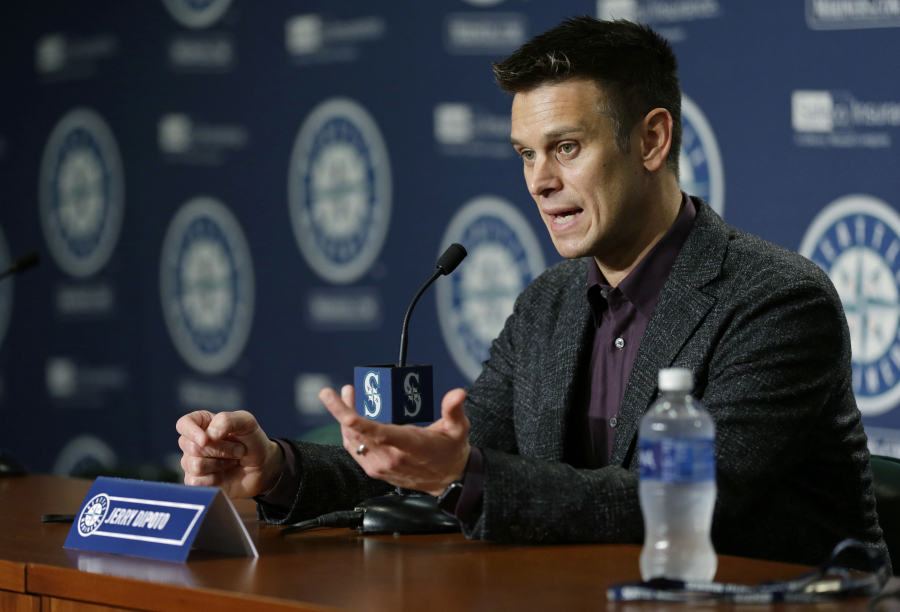Jerry Dipoto found himself in a situation familiar to any longtime fan of the Seattle Mariners.
At his Seattle-area home, the Mariners general manager watched on television as his team got blown out on the road.
On April 25, the Mariners trailed the Detroit Tigers 15-4 when Dipoto’s wife asked ‘why are you so calm?'”
But his serenity wasn’t that of someone resigned to a loser’s fate.
Rather, Dipoto flashed back to when he pitched for the Colorado Rockies. Many cruel fates awaited hurlers in that team’s hitter-friendly ballpark.
On that day, he was on the mound as his team trailed 20-1.
It’s baseball. Stuff happens.
“We can’t let the chaos of the moment define what we do,” Dipoto said.
Dipoto told that story last week at the annual meeting of the Associated Press Sports Editors Northwest chapter in Seattle.
He was scheduled to speak for an hour. Eighty minutes later, the high-energy Dipoto was still sprinkling in references to WAR (wins above replacement) and other terms of that odd linguistic dialect called baseball analytics.
But in plain English, Dipoto had a message. While unhappy with the team’s slow start, the Mariners are well-positioned to break the longest active playoff drought in Major League Baseball.
Dipoto was hired after the 2015 season. He followed the disastrous seven-year tenure of Jack Zduriencik that left the Mariners’ minor league system in shambles.
The franchise Dipoto inherited had a solid core of highly-paid veterans (Robinson Cano, Nelson Cruz, Kyle Seager and Felix Hernandez). But in looking at the Triple-A and Double-A ranks, Dipoto saw few players with whom he could surround that core in the next three years. Wait any longer and that core would be past its prime.
“We had to do bit of gardening as far as shoring up our periphery,” he said. “You had a bunch of young players who wouldn’t have arrived in time. It was out of whack.”
Dipoto wanted players who are fast, versatile and play good defense. He also wanted a 40-man roster stocked with players age 26 and under, poised to break into the Major Leagues and whose contracts are “controllable” for the next few years.
So Dipoto acquired players such as Taylor Motter, Mitch Haniger, Ben Gamel, Guillermo Heredia, Dan Vogelbach and Mike Freeman. All have seen Major League action this season, either by design or as fill-ins for injured players.
“We have no less than a dozen guys, all with less than one year of major league service, who project as consistent major leaguers,” Dipoto said.
Dipoto scoffs at the baseball adage of a “five-year plan.”
“You’re playing to win on this day,” he said.
That day-to-day effort has been hampered by injuries; 10 players have already spent time on the disabled list. Six of Seattle’s eight series have been against teams with winning records last year.
When you step back, look at the franchise-wide picture and see the top-to-bottom rehabilitation project Dipoto has been tasked with, you realize there are no quick fixes.
But hearing Dipoto speak leaves one with confidence in his plan. And that should have Mariners fans breathing a bit easier, blowout loss or not.
Micah Rice is The Columbian’s Sports Editor. Reach him at 360-735-4548, micah.rice@columbian.com or follow him on Twitter @col_mrice.





